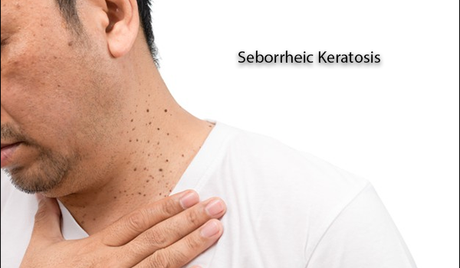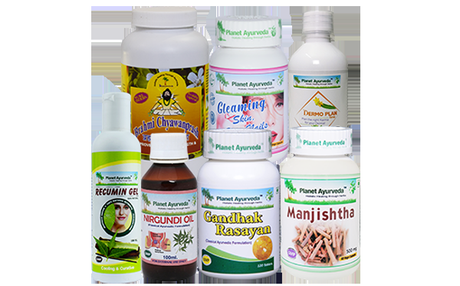
Abstract
Keratosis is an unwanted growth of keratin over the skin or on mucus membranes from keratinocytes. Keratinocytes are the prominent cell type in the epidermis. This is a disease of skin which is the largest organ in our body. This is usually a soft, flexible outer tissue that covers the body of vertebrate animals. Its main functions are protection, regulation and sensation. There are different types of keratosis such as actinic keratosis (solar keratosis), chronic scar keratosis, hydrocarbon keratosis, keratosis pilaris and seborrheic keratosis. But in this article we are going to discuss one of the keratosis called seborrheic keratosis and its ayurvedic management.

Introduction
Seborrheic keratosis is a skin disease which is characterized by non-cancerous skin tumors. These skin tumors originate from cells in the outer layer of the skin. Tumors appear in various colours from light tan to black. These growths are not harmful in nature. But in some cases, a seborrheic keratosis can be difficult to differentiate with melanoma which is a very serious type of cancer. These growths are present over the chest, scalp, shoulders, back, abdomen and face or it can be found anywhere on the body except on the soles of the feet or palms. But these growths usually appear on the head, neck, chest or back.
Etiology/Causes
The exact cause of this disease is not known. But it believes that the growth tends to run in some families. So means genes play a role in this disease.
Clinical Features/Signs and symptoms
These are usually brown or light tan in colour. The growth looks like a waxy or wart like. the common symptoms of seborrheic keratosis are:
- It ranges in colour from light tan to brown or black.
- It is round or oval in shape
- Slightly raised with a scaly surface
- It may itch
- It also varies in size (from very small to more than 1 inch)
Risk Factors
Following persons are at a high risk for developing seborrheic keratosis:
- Older age
- Family history
- Frequent sun exposure
Differential Diagnosis
Following conditions may resemblance with seborrheic keratosis:
- Dermatosis papulosa nigra
- Melanoma
- Lentigo maligna
Diagnosis
Doctors can usually diagnose this disease just by looking at it. The lesions can appear in groups on the scalp, under the breasts, over the spine or in the groin area. Dermatoscopy can be done to diagnose this disease.
Treatment
Generally, no treatment is required for seborrheic keratosis except for cosmetic reasons. These lesions can be treated with electrodessication and curettage. Some options for removing a seborrheic keratosis are:
- Cryosurgery (Freezing with liquid nitrogen)
- Electrocautery (Burning with an electric current)
- Curettage (scraping the skin's surface)
- Ablation (vaporizing the growth with a laser)
- Applying a solution of hydrogen peroxide
Herbal Remedies for Seborrheic Keratosis
Planet Ayurveda offers wonderful herbal products for this disease without undergoing any surgery. Planet Ayurveda is a herbal manufacturing company and Ayurvedic clinic. The products are 100% pure and vegetarian and made using the standardized extracts of potential herbs. Also, this manufacturing company is internationally certified. Planet Ayurveda provides following herbal products for the treatment of seborrheic keratosis:
- Manjishtha Capsules
- Gandhak Rasayan
- Gleaming Skin Hair Nails
- Brahmi Chyawanprash
- Dermo Plan Syrup
- Nirgundi Oil
- Recumin Gel


Products Description
1. Manjishtha Capsules
This is the best natural purifier. This is a single herbal formulation which enhances blood circulation and detoxifies the body. These capsules are made with the standardized extracts of Manjishtha (Rubia cordifolia). This is used in Ayurveda mainly for skin ailments as it has strong blood purifying qualities. It also helps in the treatment of fever.
Dosage: 1 capsule twice a day with the plain water after meals
2. Gandhak Rasayan
This is a classical formulation and is the best natural supplement for all skin disorders. This is made by shuddha gandhak (purified Sulphur). This improves the immune system. It also helps in eliminating the harmful effects of toxins. This is a good remedy for all types of skin diseases as it purifies the blood. Regular use of gandhak rasayan gives luster to the skin and treats any skin disease.
Dosage: 1 tablet twice a day with the plain water after meals
3. Gleaming Skin Hair Nails
This is a poly herbal formulation for healthy skin, hair and nails. It clears the blocked blood channels and also helps in clearing the toxins from the body. It is made with Manjishtha (Rubia cordifolia), Pitt papda (Fumaria officinalis), Chiretta (Swertia chirata) and Ghrit kumara (Aloe barbadensis). It nourishes and repairs the damaged skin cells. It fights skin disorders like psoriasis, impetigo, seborrheic keratitis etc.
Dosage: 1 capsule twice a day with the plain water after meals
4. Brahmi Chyawanprash
This is an Ayurvedic medicine in avaleha (Paste) form. It is used in clearing the toxins or we can say it helps in detoxification of the body as it contains Brahmi (Bacopa monnieri), Dashmoola (Roots of 10 herbs), Bala (Sida cordifolia), Ashwagandha (Withania somnifera), Bhumiamla (Phyllanthus niruri), Punarnava (Boerhavia diffusa) etc. It helps in cellular rejuvenation. It also helps in managing stress. Because of its detoxification qualities it helps in managing skin disorders like seborrheic keratosis.
Dosage: 1 teaspoonful twice a day after meals
5. Dermo Plan Syrup
This is an Ayurvedic medicine in a syrup form. It helps to clean the blood from impurities and toxins. It is beneficial in seborrheic keratosis. It makes the skin absolutely flawless and restores elasticity. This syrup is made from potential herbs such as Manjishtha (Rubia cordifolia), Giloy (Tinospora cordifolia), Chopchini (Smilax china), Neem (Azadirachta indica), khadir (Acacia catechu) etc. It also helps in reducing inflammation from skin.
Dosage: 2 teaspoonful twice a day after meals
6. Nirgundi Oil
This ayurvedic oil is helpful in all types of wounds. It is obtained from the leaves of Nirgundi (Vitex negundo) and mixed with extracts of potential herbs like Manjishtha (Rubia cordifolia), Haridra (Curcuma longa), Kalahari (Gloriosa superba). This oil is enriched with anti-inflammatory properties. It is also helpful in treating respiratory disorders like asthma.
How to Apply: apply this oil over the affected area two times a day
7. Recumin Gel
This is an Ayurvedic formulation that helps in skin disorders. It is beneficial in seborrheic keratosis. It is a 100% natural product of planet ayurveda and free from chemicals, preservatives, starch, additives. This gel is made by using herbs such as Curcumin (Curcuma longa), Neem (Azadirachta indica) etc. It provides nourishment to the skin and helps in healing the unwanted growth over the skin.
How to Apply: apply this gel over the affected area two times a day
Conclusion
We concluded that in allopathic medicine the only treatment protocol for seborrheic keratosis is surgery. As we all know that this surgical procedure is left with the scar mark over the skin. So, it's better to follow the Ayurvedic treatment for better results. These products of Planet Ayurveda are safe to use and also help in detoxification of the blood.

